
 |
||||
|---|---|---|---|---|
| Volume 44 Number 4, February 1, 2014 | ARCHIVE | HOME | JBCENTRE | SUBSCRIBE |
There Is An Alternative!
Workers' Weekly Internet Edition: Article Index :
There Is An Alternative!
Putting the Health Monopolies on NoticeEU-US Free Trade Agreement:
Opposition Forces Consultation on Proposals to Allow Monopolies to Sue States
Weekly On Line Newspaper of the
Revolutionary Communist Party of Britain (Marxist-Leninist)
Website:
http://www.rcpbml.org.uk
E-mail:
office@rcpbml.org.uk
170, Wandsworth Road, London, SW8 2LA.
Phone: 020 7627 0599:
Workers'Weekly Internet Edition
Freely available online
Workers' Weekly E-mail Edition
Subscribe
by e-mail daily: Free / Donate
WW
Internet RSS Feed
![]()
The Line of MarchMonthly
Publication of RCPB(ML)Subscribe
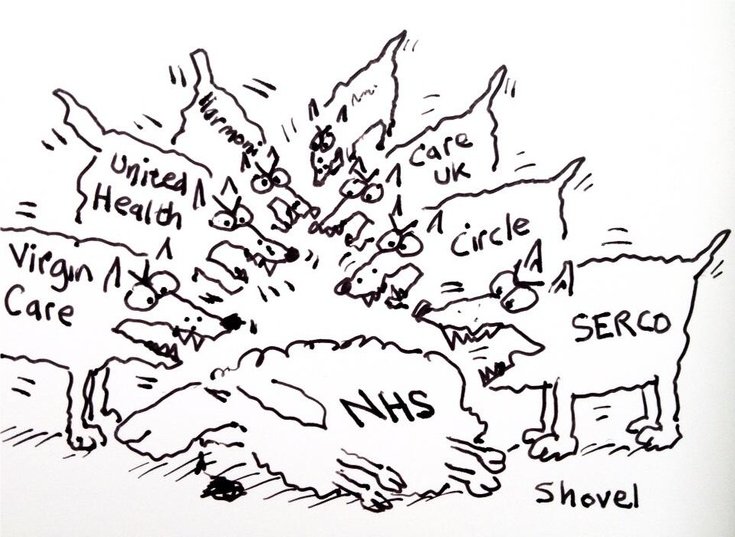
Health
workers and community campaigns are continuing to build their resistance to the
dictate of the Coalition government and to safeguard the future of the NHS. At
the same time, whilst this resistance is also reflected amongst some MPs of all
the big parties in parliament, what is not challenged is the assumption that
the health economy must continue to be subject to cuts and to the dictate of
the financial oligarchy and the monopolies, who demand to be paid over claims
of the people under the excuse of “austerity”. Public right must
prevail over monopoly right. The claims of the health workers and society must
be satisfied over the claims of these monopolies.
The government’s direction of travel with its Health and Social Care Act 2012 is to further open the NHS up to the private monopolies. This was highlighted in the fact that 70% of all NHS contracts that have been awarded since April 2013 have gone to commercial companies. A report of the NHS Support Federation (NHSSF)1 points out that in excess of £5 billion worth of contracts to run, or manage, clinically related NHS services have been advertised in the first 9 months since the competition regulations (section 75) of the Health and Social Care Act 2012 were passed by Parliament. For example, contracts for small services such as learning disabilities, drugs and alcohol misuse which have over the recent years been fragmented into bite size chunks are now being steered through the “health market”. The government and commissioning authorities are deliberately targeting living standards of health workers to pay for the profits of the health monopolies, regardless of the risks to patients and their services. This also includes many emergency, or urgent healthcare care services, emergency and other ambulance services, the running of urgent care centres and hospital A&E units, the 111 services and almost all GP Out-of-Hours care.

At the same
time, the NHS Development Authority2
risk assessments have published a record number of NHS Trusts that they claim
to be “failing”. Successive governments have hidden their hands
whilst slashing the budgets of these Hospital Trusts through “efficiency
savings” which cuts around 4-5% of their budget each year. Unlike
government handouts to the rich, these NHS Trusts provide the backbone of life
and death secondary care across the NHS and have no other source of income. The
NHSSF points out: “This all has the aim so that the private sector
is extending beyond the provision of care to include management, planning and
commissioning functions. One of the most recent awards gave the country’s
biggest management consultancies and accountancy firms a share in a £200m
pot to offer ‘failing’ NHS hospitals strategic direction and
temporary management. Deloitte, Ernst and Young and McKinsey are amongst those
due to benefit.” It also has the aim of privatising and closing
“failing services” and even whole hospitals through such mechanisms
as the Trust Special Administrators appointed by government and through
“commissioning”.
Alongside this there are the US-EU Transatlantic Trade and Investment Partnership (TTIP) negotiations. The present government supports these negotiations which aim at a convergence of the regulations of the EU and the US, across everything and which have the purpose to open up the NHS to binding “irreversible” contracts from the US global monopolies as well as the EU monopolies.
A report by the National Health Action Party (NHA) points out that the TTIP “goes way beyond previous trade agreements” opening up the NHS and other public services to these global health monopolies. It includes investor state dispute settlement (ISDS) which will allow these US along with EU monopolies to sue governments directly, for compensation for all profits lost from any government, or local authority action. The reports say that the “disputes are adjudicated by ‘arbitration’ panels, made up of trade lawyers, judging only on values of ‘free trade’, taking no account of social, environmental or human rights values.3”
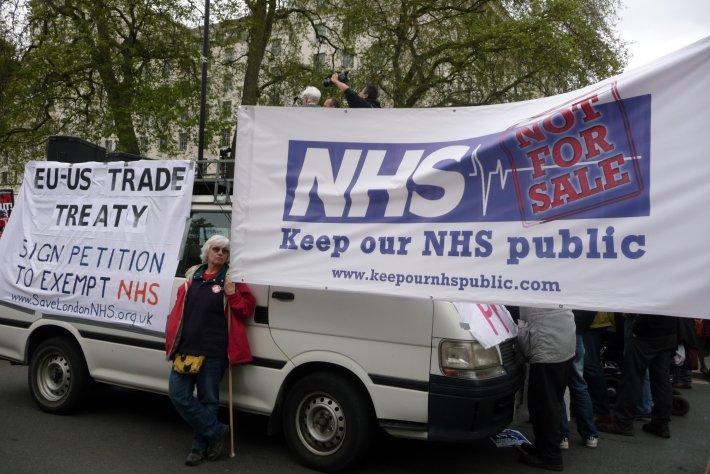
According to
these reports, Trade unions were among 200 organisations who this month wrote
to European and US trade negotiators to express their concerns about the plan.
Frances O’Grady, General Secretary of the TUC, was reported as saying:
“US healthcare companies should know that they have been put on notice.
They should not expect the forthcoming EU-US trade deal to protect them from a
future British government restoring NHS services currently run by private firms
to the public sector.”
This stand is within the context of the fight for a change in the direction of the economy and the direction of society as a whole. Public right must prevail over monopoly right. All the talk of debts, losses and inefficiency and “failing” NHS Trusts is to cover over the reality that the level of healthcare spending is being cut by executive decision of the government diverting these funds to pay the huge “interest” payments to the financial oligarchy.
The government must be held responsible for wrecking the NHS, the health economy and the plight of “failing” NHS Trusts. The future of the NHS must be fought for by affirming that health care is a right, and that the people have a right to decide on the future of the NHS. The monopolies must be held to account and their secret “trade agreements” abrogated and the people must demand a public inquiry into the profits that the private sector has made from its involvement in the health service, with the aim of the restitution of the siphoned-off funds to the public treasury. The health monopolies must be put on notice: No to the privatisation of health care! Yes to the public good!
1 NHS Support Federation http://www.nhsforsale.info/privatisation-list/contract-alert/contract-alert-report-apr-dec.html
2 http://www.ntda.nhs.uk/wp-content/uploads/2013/12/Paper-E-Service-Financial-Performance-30-Nov13.pdf
3 http://nhap.org/privatisation-will-be-irreversible-unless-the-nhs-is-exempted-from-the-eu-us-trade-deal/
ShareThis

Talks on the
Transatlantic Trade and Investment Partnership (TTIP), a
“free-trade” agreement between the EU and the US, were officially
launched in July last year. The agreement is unprecedented both in its size and
in the short timescale through which it is to be pushed. The parties aim to
complete negotiations by the middle of next year. Presented as eliminating
protectionism, boosting growth and jobs, the aim of this agreement is to remove
restrictions on the powerful multinational corporations against the interests
of the people. In particular, it seeks the liberalisation of the service
sector, including opening up state-run services such as the NHS to the
monopolies.
The TTIP currently includes a proposed mechanism for Investor-State Dispute Settlement (ISDS), which has been described as a “corporate bill of rights”. This proposal was originally kept under wraps in accordance with the secrecy surrounding the agreement, and was first revealed in leaked draft documents. It is now spoken about openly. It would allow US companies investing in the EU to directly challenge EU governments at private international tribunals, and vice-versa.
In a similar existing arrangement, under the terms of the North American Free Trade Agreement, Lone Pine, a US-based company, is suing Canada for a quarter of a billion US dollars for calling a moratorium on fracking in parts of Quebec.
In the face of opposition, EU Trade Commissioner Karel De Gucht announced on January 21 that the European Commission will hold a three-month public consultation on ISDS. In a letter to all 28 trade ministers, he said: “The widespread public message on the inclusion of investor protection and ISDS in the treaty has convinced me that it is necessary to allow for a public reflection about the way the EU should tackle these negotiations.”
Meanwhile, negotiations will continue on the rest of the TTIP.
Earlier this month, ten European health, transparency and environmental NGOs* issued a joint statement condemning the TTIP, and in particular the ISDS proposal.
“The arbitration panels over these disputes may have the ability to levy crippling fines in line with ‘potential’ profit loss. One can easily see how smaller Member States would effectively handover sovereignty to multinationals as fines could be equal to a significant proportion of GDP,” they warn. “What is masquerading as a trade deal may be a far more sinister attempt to roll-back environmental and public health laws built up over decades in the name of corporate efficiency.”

The main
centre-left EU parliamentary bloc, the Socialists and Democrats, stating their
opposition to the inclusion of the proposed ISDS in the agreement, also
released a statement on January 21.
Further, the Dutch parliament had previously, on November 28, passed a resolution expressing concern over ISDS and requesting the government to investigate the potential social and environmental risks.
In Britain, trade unions and the TUC have stated their opposition to TTIP and IIDS; TUC General Secretary Frances O’Grady met De Gucht in Davos at the World Economic Forum on January 23. Greenpeace and the Green Party have also expressed their opposition. Green Party MP Caroline Lucas tabled an Early Day Motion in the Commons on January 26 calling for ISDS to be removed from the agreement, which was signed by 26 MPs of various parties.
Such statements themselves reflect the opposition of the working class and broad sections of the people who are engaged in defending public right over monopoly right. The movement to safeguard the NHS in particular has exposed the role of the widely-condemned Health and Social Care Act in preparing the ground for the agreement.
It is in the context of this opposition, as well as contradictions between the EU and the US, that the European Commission made its announcement.
“Governments must always be free to regulate so they can protect people and the environment,” wrote De Gucht. “But they must also find the right balance and treat investors fairly, so they can attract investment.”
The people of Britain and Europe must reject this blackmail and such pragmatic, loaded notions of “balance” and “fairness”. The TTIP agreement is a sign of stepped-up trade wars between the old powers of the US and Europe, and the rising powers of Asia, in particular China. The blackmail is that there is no alternative to this dangerous course. In rejecting it, the Workers’ Opposition must put forward an alternative to the Europe and North America of the monopolies. This necessarily recognises the public right to invest in social programmes in opposition to the monopolies’ demand to be paid tribute.
The next stages in the negotiations are for De Gucht to meet his US counterpart Trade Representative Michael Froman in Washington, on February 17-18, and following that, the fourth round of talks will be held from March 10-14 in Brussels. The Coalition government is also exposed in these sordid negotiations and their nominal opposition to the powers of the EU. This “opposition” merely reflects the dog-fight among the different monopoly interests. The government is fully committed to a programme of enforcing monopoly right. The Workers’ Opposition must use every opportunity to strengthen the conscious opposition of the working class movement to the Europe of the monopolies and all attempts to strengthen monopoly dictate over the working class and people.
________________
* CEE Bankwatch Network, Climate Action Network Europe, Corporate Observatory Europe, European Public Health Alliance, European Environmental Bureau, Friends of the Earth Europe, Health and Environment Alliance, Nature Friends International, Transport Environment and the World Wide Fund for Nature.
ShareThis
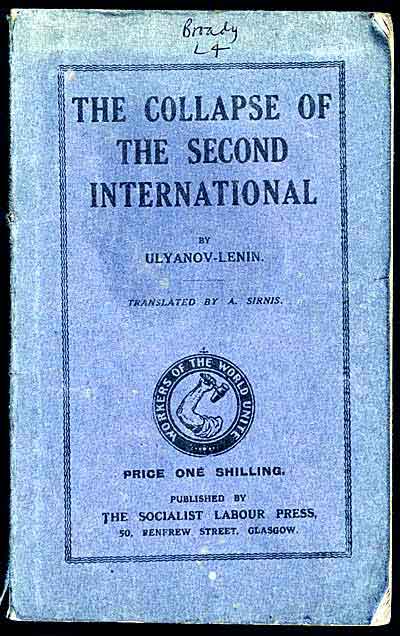
Lenin's work "The Collapse of the
Second International" in which he
excoriated the socialist parties of
the Second International for
their betrayal - from the
Red Clydeside collectionThe commemorative events to mark
the centenary of the start of World War I, as well as the speeches of various
politicians, seek not only to distort the predatory imperialist nature of the
conflict, waged by Britain and the other big powers to re-divide the world, but
also to hide the that there was sustained opposition to the war and its
consequences, not only in Britain but also in many other countries, in which
the working class played a leading role.
In the period before 1914, workers in Britain had waged strikes, organised themselves in new ways and taken increasingly militant action in defence of their interests. It was in these circumstances that before the outbreak of war in 1914 the Labour Party, along with the other social democratic parties of Europe, had pledged to oppose an inter-imperialist war between the big powers. It had adhered to the resolution, re-adopted at the Basle Congress of the Second International in 1912, that all such parties “should use every effort to prevent war by all the means which seem to them most appropriate”. In the event of war, “it was their duty to intervene in favour of its speedy termination and with all their powers to utilise the political and economic crisis created by the war to arouse the people and thereby hasten the downfall of capitalist class rule”.
However, as soon as war was declared the Labour Party and TUC leaders declared “that an immediate effort be made to terminate all existing disputes…and, wherever new points of difficulty arise during the war a serious attempt should be made by all concerned to reach an amicable settlement…” They declared their support for the predatory war, created the conditions for the government to declare strikes and other trade union activities illegal in many industries for the duration of the war, and to introduce the draconian Defence of the Realm Act (DORA), which made active opposition to the war a criminal offence. In 1915, leading members of the Labour Party joined the warmongering coalition government.
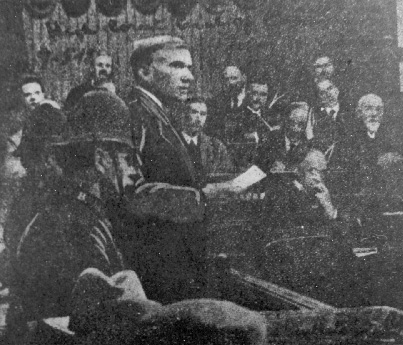
Speech of John Maclean from the dock
at his trial for sedition, May 9, 1918 Nevertheless,
opposition to the war and to its economic effects continued, most famously
amongst the workers in the munitions factories in Scotland. As early as 1915,
over 10,000 workers in Glasgow took unofficial strike action against the
attacks on their living standards. Local shop stewards organised what became
the Clyde Workers’ Committee, with hundreds of delegates elected directly
from the workplace meeting on a weekly basis. Thousands of workers in South
Wales also took strike action against repressive government legislation aimed
at curtailing their rights, while in 1917 engineering workers throughout
Britain went on strike in opposition to government plans for more widespread
military service and other anti-worker measures.
Opposition to the war and the government’s policy of forced conscription was widespread. There were 16,000 officially declared “conscientious objectors”, who refused to join the armed forces on principle and several thousand of them were imprisoned for their stand. DORA gave the government the power to suppress the activities of the anti-war movement and to attack the right to speak and to publish. Several leading anti-war activists, including the Scottish teacher and revolutionary John Maclean, were arrested and imprisoned as a consequence. Opposition to the war and the demand for its termination were greatly strengthened after the revolutionary events in Russia in 1917. At the Leeds Convention of over a thousand delegates from labour, trade union and socialist organisations held in June of that year, there was overwhelming support for an end to war and for establishing workers’ and soldiers’ councils throughout Britain to usher in an anti-war government.
One of the key features of World War I was that it was waged not in “defence of democracy” or for a “noble cause”, but by the rich and their governments to pursue their interests abroad against the interests of the workers of Britain and other countries. The war aims of the rich were in practice supported by those forces which rapidly conciliated with the warmongers on the grounds of defending Britain and its empire against “German militarism” and who thereby betrayed the interests of the workers and the cause of peace. It showed that to safeguard their interests the workers themselves had to organise to be at the forefront of the anti-war movement. In this centenary year, this is a crucial lesson for the working class movement.
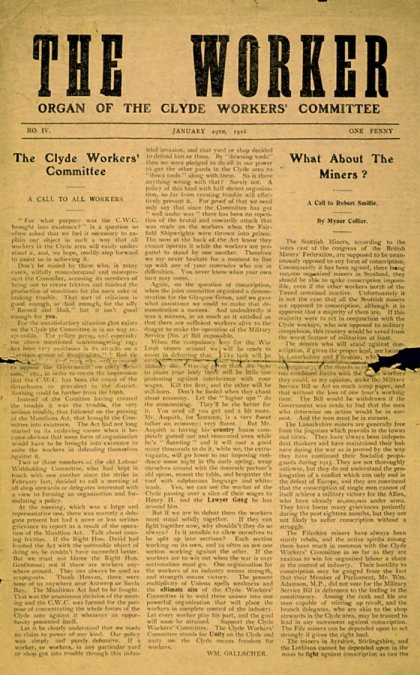
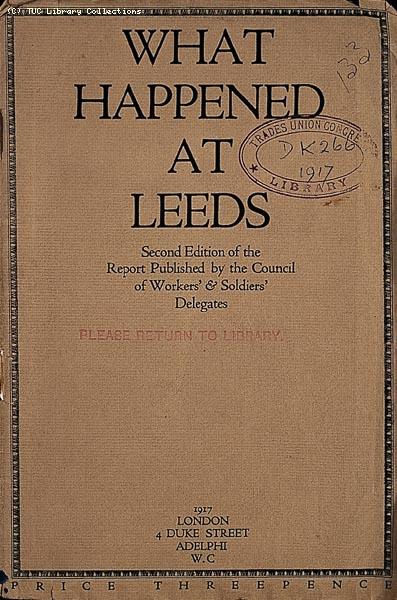
Left -The Worker, January 29, 1916 ; Right - Leeds
Convention to end the war and establish workers' and soldiers'
councils
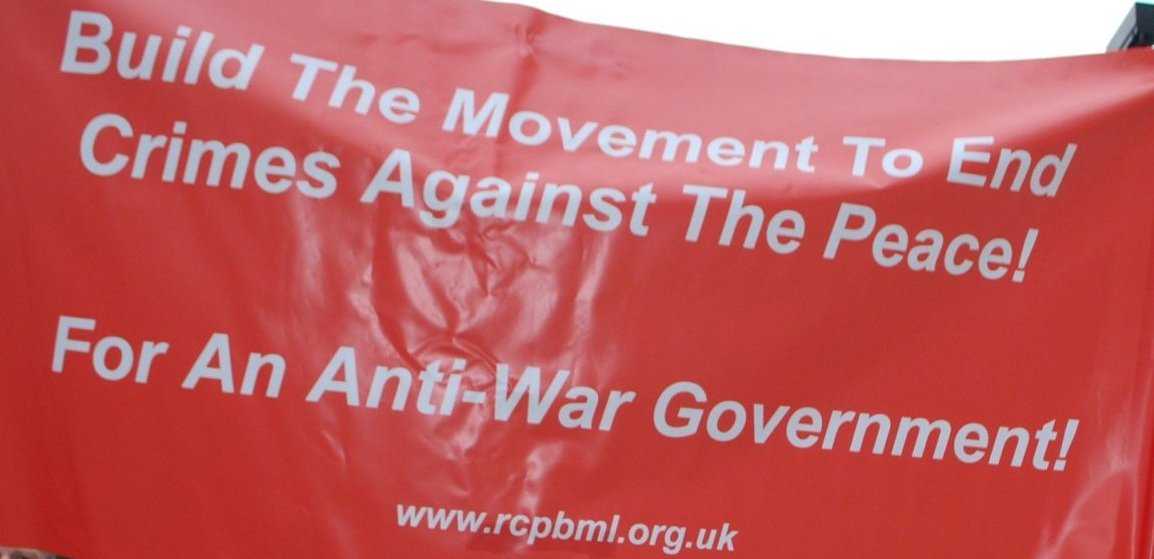
ShareThis
CELEBRATION AND SEMINAR
|
ShareThis